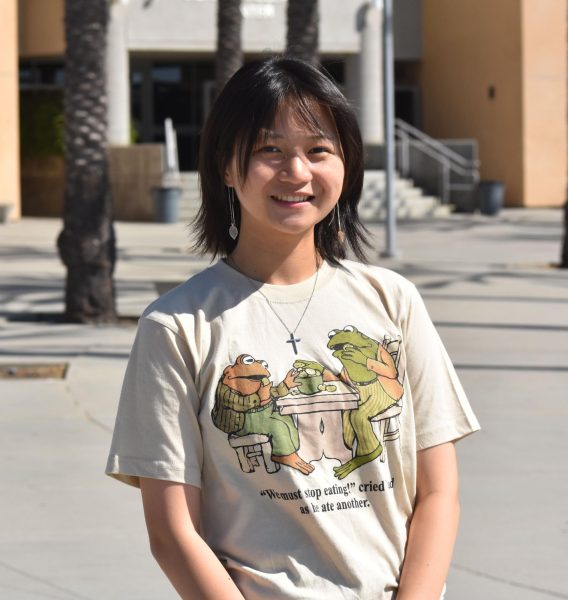Transfer students adjust to life in America together
February 18, 2022
On his first day of sixth grade in 2018, Neil Zhu (9) walked through the gates of Mesa Verde Middle School with a sky-blue backpack slung over his shoulders and a translator app open on the cellphone gripped tightly in his hand.
Unlike most students, Zhu’s apprehensions did not stem from entering middle school for the first time, but rather from attending his first day of school in America.
Zhu had recently moved from Beijing to San Diego after his father was transferred to a branch of his company that operated in the United States.
“The first day of sixth grade was very tough,” Zhu said. “Back then, my English was very bad and I couldn’t understand the things the teachers. I had to use the translator all the time.”
On that same day, Rintaro Watanabe (9) also walked into Mesa Verde Middle School for his first day of middle school. Watanabe had moved from Kanagawa, Japan, and, like Zhu, he had just begun his journey in learning English.
“I was scared because I couldn’t speak English very well, and I didn’t have friends at Mesa Verde when I first moved here to America,” Watanabe said.
Zhu and Watanabe met in sixth grade and became friends after bonding over their shared struggles with learning English and having to use a translating app to communicate with classmates and teachers. The two became each other’s first friend in America.
“Neil helped me [with] English a lot,” Watanabe said. “When I came here, I didn’t know how to speak or how to pronounce English vocabulary, so Neil helped me [learn].”
On Feb. 1, 2020, Daniel Kim (9) moved from Seoul to San Diego. In his first few months in America, Kim’s adjustment to his new environment was difficult.
Taking his first steps inside his new home, he found some of the artwork and dolls he had made with his closest friends in Korea and instantly felt a wave of homesickness wash over him. At that moment, Kim said he almost felt like crying.
“When I would come home to my [house] in Korea there was stuff like my chair or my desk, but [not] here,” Kim said. “[But after coming to America,] there [were] episodes where I [would] feel sad [and] homesick sometimes. There was [even] a day where I felt ‘[I’m] going back to Korea.’”
Kim said that he missed having so many things so close to his home.
“[In Korea], if I run for ten seconds, there’s a convenience store, a PC cafe or just a cafe,” Kim said. “I can get [anywhere while] running, but here, I can’t.”
Despite missing his hometown, Kim knew that he still had to learn to adjust to his new life in America, such as by learning English vocabulary and colloquialisms. Kim started to take an ELD (English Language Development) class at Mesa Verde, and that was where he met Watanabe.
“When I first came here, I felt lonely because there were no Korean friends,” Kim said. “When I first met Rintaro, he was so friendly because he also couldn’t speak English, so he was my first friend.
Kim also stated that speaking English with Watanabe, who was also learning the language, allowed them to discuss the confusion they faced when picking up the idiosyncrasies of English grammar.
“After I met him, [Rintaro] helped me develop my English since he spoke to me in English and taught me some things we learned in school like vocabulary and grammar,” Kim said.
After meeting Watanabe, Kim started to feel his longing for Korea fade away.
Zhu and Kim met each other during Wolverine Time and started talking to each other after they realized that they had been in the same homeroom at Mesa Verde Middle School without even realizing it due to the online learning format at the time.
The two started bonding over both being interested in 3D printing, talking about their upcoming projects and the specific ideas they had for items they wanted to print.
“We share our ideas,” Kim said, “Neil told me he had printed a pink tennis racket and a 3D printer [and] he showed it to me first. I’ve printed the kunai from Naruto that I drew, [and] some shuriken.”
Kim said that meeting Watanabe and Zhu made him feel less alone, not only because they had common interests, but also because they shared common experiences.
“When I first went to the school, the feeling was ‘it’s not that bad.’ The people sitting near me were also [people] whose second language was English,” Kim said. “My first period was ELD. I met Rintaro in that first period, so [it] was not that bad in Mesa Verde. I had almost every class with Rintaro, just [not] science.”
In addition, Kim said both Watanabe and Zhu were helpful when recommending which classes to take. The two also helped him with completing his social studies and language arts homework, since the two had attended school in America longer than he had and understood the requirements for assignments.
“Actually, they [kind of] gave me an answer, because they came here a year ago and share some information I have to know,” Kim said.
Thanks to the friendship Kim was able to form with Watanabe and Zhu, Kim said that his adjustment to America has been a smoother transition with their guidance.
“If it wasn’t for Rintaro and Neil, [my life] would’ve been worse,” Kim said. “If it wasn’t for them, I probably would’ve gone back [to Korea or] would’ve felt homesick more. They helped me overcome a lot of my homesickness.”


